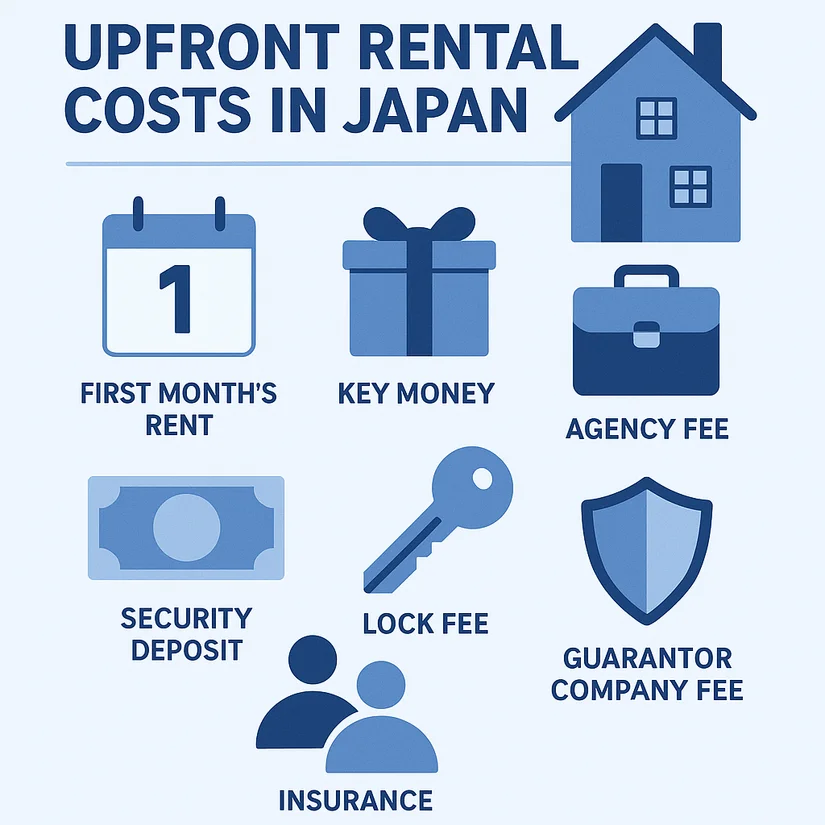How Much Key Money, Deposit, and Agency Fees Really Cost in Japan

Renting an apartment in Japan comes with a unique set of upfront costs that can surprise newcomers. From traditional fees like key money to modern requirements like rent guarantee companies, understanding these charges is essential for anyone planning to live in Japan. In this guide, we break down the typical costs — with real examples and comparisons — to help you prepare and budget wisely.
Key Money (礼金)
Key money, or reikin (礼金), is a non-refundable gratuity paid to the landlord when signing a lease. It’s not a deposit and will not be returned.
Why It Exists
This practice started post-WWII, when housing was scarce and tenants offered money to thank landlords. It's still common in high-demand areas, but newer listings often waive it.
- Typical Range: 1 to 2 months’ rent
- Negotiable: Yes, especially in newer or foreigner-friendly listings
Security Deposit (敷金)
Security deposit or shikikin is refundable and used for unpaid rent, cleaning, or minor damage repair.
- Typical Range: 1 to 2 months’ rent
- Common Deductions: Cleaning, repairs, lost keys
In small leases, landlords may ask for more key money instead. In business leases, deposits help build trust without a guarantor.
Rent Guarantee Companies
Instead of a guarantor, most landlords ask tenants to sign with a rent guarantee company. This is common for foreigners.
- Major Providers: Nihon Safety, GTN, J-lease, Casa
- How it Works: You pay the company, they pay the landlord
- Initial Fee: 50–100% of one month’s rent
- Monthly Fee: ¥500–¥1,200
Agency Fee (仲介手数料)
This is a non-refundable commission paid to the real estate agency.
- Standard: 1 month’s rent + 10% tax
- Refundable: No, even if you cancel
Other Fees
| Fee | Amount | Description |
|---|---|---|
| Cleaning Fee | ¥20,000–¥50,000 | One-time or from deposit |
| Maintenance | ¥3,000–¥10,000/month | Shared building costs |
| Lock Exchange | ¥10,000–¥20,000 | Security measure |
| Fire Insurance | ¥15,000–¥20,000 | 2-year coverage |
| Renewal Fee | 1 month’s rent | Common in Tokyo area |
Example Cost Breakdown (Tokyo ¥80,000 Rent)
| Item | Amount | Notes |
|---|---|---|
| Rent | ¥80,000 | First month |
| Key Money | ¥80,000 | One-time |
| Deposit | ¥0 | None |
| Agency Fee | ¥88,000 | Incl. tax |
| Maintenance | ¥5,000 | Monthly |
| Lock Exchange | ¥15,000 | One-time |
| Fire Insurance | ¥18,000 | 2 years |
| Guarantor Fee | ¥40,000 | 50% rent |
| Total | ¥326,000 | ~4.1x rent |
No Key Money Scenario
| Item | Amount | Notes |
|---|---|---|
| Rent | ¥80,000 | |
| Key Money | ¥0 | Waived |
| Deposit | ¥0 | Waived |
| Agency Fee | ¥88,000 | |
| Maintenance | ¥5,000 | |
| Lock Exchange | ¥15,000 | |
| Fire Insurance | ¥18,000 | |
| Guarantor Fee | ¥40,000 | |
| Total | ¥246,000 | ~3.1x rent |
Tokyo vs Osaka
| Item | Tokyo (¥120K) | Osaka (¥80K) | Notes |
|---|---|---|---|
| Key Money | ¥120,000 | ¥0–¥40,000 | Often waived in Osaka |
| Deposit | ¥0–¥120,000 | ¥40,000 | Preferred in Osaka |
| Agency Fee | ¥132,000 | ¥88,000 | Incl. tax |
| Guarantor Fee | ¥60,000 | ¥40,000 | ~50% rent |
| Other Fees | ¥20K–¥40K | ¥15K–¥30K | Lock/Cleaning |
| Fire Insurance | ¥18,000 | ¥18,000 | Same nationwide |
| Total | ¥350K–¥490K | ¥246K–¥326K | Osaka cheaper |
Frequently Asked Questions
Frequently Asked Questions
Is key money (礼金) illegal in Japan?
No, it’s legal but optional. It’s more common in older or high-demand units.
Can I rent an apartment in Japan without a guarantor?
Yes. Most foreigners use a guarantor company instead of a personal guarantor.
When is the best time to rent an apartment in Japan?
The best time is between May and August, when there is less competition and more chances to negotiate on fees. Avoid February to April, which is the peak moving season due to job transfers and school enrollments.
How long does it take to move into an apartment after signing?
It usually takes 1 to 3 weeks after signing the lease to move in. The timeline depends on the cleaning schedule, lock change, and how fast the guarantor company approves your application.
When is the best time to rent an apartment in Japan?
The best time is between May and August, when there is less competition and more chances to negotiate on fees. Avoid February to April, which is the peak moving season due to job transfers and school enrollments.
Are there any apartments with zero upfront costs?
Some offer no key money, deposit, or agency fee — but other basic fees still apply.
Do foreigners pay more to rent?
Generally not. However, foreigner-friendly guarantor companies like GTN may cost more due to extra services.
Do I pay more if I have a pet?
Yes. Pet-friendly listings often charge extra rent and/or additional key money.
Conclusion & Links
Japan’s rental system can seem complex, but once you break down the costs, it's manageable. Use this guide to estimate and compare upfront costs.
Explore our other guides:
